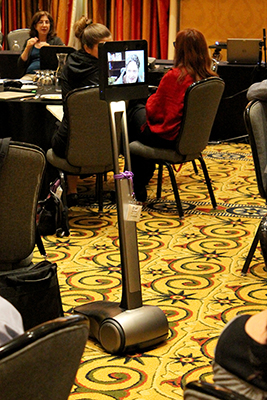Keynote Address Given Via Beam Robot at AccessEngineering CBI

Traveling to conferences can be difficult, whether due to the time spent on an airplane, personal obligations, or a disability that makes travel difficult. The Beam telepresence robot, from Suitable Technologies, allows individuals to attend a conference remotely. The Beam Robot features a screen and two cameras, and moves about on wheels, allowing users to control the robot from anywhere via their computer in order to interact with other participants. Attending and presenting at conferences is an important part of building a professional resume. For people with disabilities or those who cannot travel easily for other reasons, attending a conference remotely offers a way to still interact, share ideas, and network.
At the AccessEngineering Capacity Building Institute (CBI), held on April 5-8 in Seattle, WA, Bradley Duerstock from Purdue University presented a keynote address on accessible hands-on learning via the Beam. Brad stood at the front of the room in the form of a Beam and used Skype to share his desktop so his presentation could be projected. After his presentation, Brad answered questions from the audience, moving about the room and facing each person who asked a question. Throughout the CBI, Brad was able to attend presentations, network with other participants, and participate in working groups and discussions.
The CBI was held as part of the AccessEngineering project, which engages faculty and students nationwide in efforts to (1) better serve a diverse student body, including students with a broad range of disabilities, in engineering courses and programs, and (2) integrate relevant disability-related and universal design content into engineering courses. Attendees included engineering faculty members, professional engineers, individuals with disabilities, disability experts, and engineering educators from universities and organizations across the country. The CBI had a particular focus on accessible hands-on learning and design and integrating information about accessibility and universal design into the engineering curriculum.